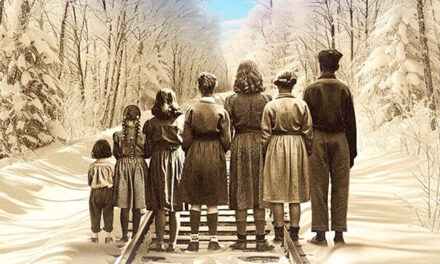Confession prayer cuts lust for money
By CHARLES GOLDBERG
Published in the Amerikaner newspaper Oct. 27, 1950
I would like to tell you about an unusual event that happened 45 years ago.
About 15 miles from Bialystok was a town that belonged to a rich landowner. He wasn’t a bad person and conducted business with the local Jews, who made a few dollars from the transactions.
Not far from the town was an inn that also belonged to the landowner. For many years it was rented to a Jew. The innkeeper was called Reb Shleyme, an unusual person among those townsfolk, for he was both learned and hospitable. The doors of Reb Shleyme’s inn were always open for guests. Everyone knew that at Reb Shleyme’s one would eat well, have a good place to sleep, and often a parting gift of a few rubles. In addition to the inn, Reb Shleyme carried on trade with the town; he was an honorable, rich man.
Reb Shleyme’s large family of sons, daughters, and sons-in-law lived together near the inn. Once a week he would go into town to buy things for the inn.
To Town For Supplies
On a winter’s Sabbath eve, after he had said the havdole prayer, Reb Shleyme decided to go to town to buy a few items. A Russian, Stashik, had worked for the family from the time he was a youngster. He lived with them and they considered him “one of the family.” Reb Shleyme told Stashik to hitch the horses to the sleigh and get everything ready for the trip into town.
When Stashik left the house, Reb Shleyme took money from a locked cabinet, spread it out on the table, and started to tally the week’s profits. When Stashik returned to tell his employer that everything was ready for the trip and saw the money on the table, hunger for it ignited his lust. As he stood near the table, dark thoughts began to work in his brain.
When Reb Shleyme finished counting the money, he tossed it into a sack, put on his warm fur coat with a woolen scarf around his throat, and a fur hat. He took the sack of money and said “Come on, Stashik.” They both got into the sleigh, which had been bedded with straw. Stashik whipped the horses and they galloped away.
The night was beautiful one, the moon shining in the middle of the sky and lighting the way. It was as bright as midday. Reb Shleyme appreciated what was around him and thanked G-d, who had given him a steady living for the members of his household.
Suddenly, Stashik stopped the horses. The sleigh stood still. Reb Shleyme turned to the Russian.
A Fine Kettle Of Fish!
“What happened? Why did you stop the horses? Has something happened?”
“No, boss, nothing is wrong with the sleigh or with the horses. I’ve decided to kill you and take the sack of money.”
Reb Shleyme laughed. “Surely, you’re making a joke, Stashik. What’s the matter with you? Have you gone crazy? Whip the horses and let’s go on.”
“I’m not joking. I really mean it. I want your money.”
“If that’s the case,” said Reb Shleyme, “take the money and let’s go back home.”
By the light of the moon, the Reb noticed that Stashik’s eyes looked as if they were on fire, and he realized that he was in great danger. To yell for help was useless; they were in the middle of the woods and there was no living soul to be seen.
So he tried to talk to Stashik in a good way.
“Just think about what you want to do. You want to murder me! I always treated you like my own child and gave you a good home; you were always a quiet, fine person and now suddenly you want to murder me, your protector? Think about how this is sinning against God. And until you die, your conscience will plague you. Your real punishment will first come to pass in the next world. You will burn in Hell. There they will burn your flesh; you will never have respite. I’m begging you, don’t do this. If you want the money, take it. I promise that I will tell no one that you took my money.”
The Devious Plan
“No, boss, I know that you will not keep quiet. You’ll turn me over to the police and they’ll send me off to hard labor. I have to kill you and take your money. I’ll come home and say that we were attacked by robbers. They dragged you out of the sleigh and killed you and I ran away. No one will know who murdered you.”
He then pulled a knife from the top of his boot and got ready to assault Reb Shleyme.
“Please, Stashik, let me at least say vidui. We Jews must say this prayer when we’re at the point of death.”
“All right, but hurry up. Somebody might come by.”
Reb Shleyme began to say his prayer with a broken heart. Then something strange happened. Stashik said, “If you want to save your life, take a rope out of the sleigh and tightly bind me hand and foot. Do it quickly before I change my mind.”
Reb Shleyme immediately took the rope and tightly bound Stashik. Then the Reb turned the sleigh around, whipped the horses, and dashed home, half dead from fright.
When the family heard the sleigh stop near the house and everyone ran out to see what had happened, they saw a very strange sight. Stashik was tied up like a calf being led to slaughter; he was struggling against the ropes and roaring like an ox.
A Miracle
Reb Shleyme looked at everyone with terrified eyes and could not utter a word. They brought him into the house until he calmed down. He told them what had happened and how he had narrowly escaped certain death thanks to a miracle from heaven.
Word spread through the town about what had occurred. The landowner came and had Stashik thrown into a dungeon overnight.
The next morning the landowner called the community leaders together. The first thing he ordered was that Stashik be given fifty lashes, and afterwards turned over to the police.
Stashik suffered through the fifty lashes with lips clenched against the pain, but uttered not a word. After this punishment was completed, the landowner told the leaders to call the police.
But Stashik protested, “I’m not guilty; I’m no murderer. The Devil convinced me to do it!”
He cried out to Reb Shleyme, “I couldn’t resist the temptation when I saw the bag of money on your table. Then, when you started to pray, something touched my heart. I realized that I had to do something and told you to tie me up.” Then Stashik hung his head and was silent.
Stashik’s words touched Reb Shleyme. “I believe that you were overwhelmed with lust for the money, and if the landowner agrees, I’ll forgive you and you can come back home with me. You’ll do your work as before because I believe that you’ve repented. I sense a real tone of regret in what you say,” he said.
The landowner was moved by Reb Shleyme’s words. He couldn’t believe that anyone could forgive such a crime and then bring the person back into his home. He agreed and left Stashik in Reb Shleyme’s hands to deal with as he saw fit.
Then the landowner spoke to the hushed crowd, “Now I understand why it is said that Jews are ‘merciful sons of merciful fathers.’”
Stashik remained in Reb Shleyme’s employ for many years. Even after the Reb passed away, Stashik continued to work for his family until he eventually died at a very old age.
8-pt:
From Tales of Bialystok, by Charles Zachariah Goldberg, translated from Yiddish by his daughter, Phyllis Ross of Slingerlands. Goldberg left Bialystok, Poland, after a pogrom in 1906. He published stories in the New York City area in the 1930s and 1940s about his experiences in Europe and in America.










